#cambronne
Explore tagged Tumblr posts
Text
He grants its overwhelming immensity, but he establishes its triviality; and he does more than spit upon it. Borne down by numbers, by superior force, by brute matter, he finds in his soul an expression: “Excrément!”
...Hapgood.
I am judging the shit out of you.
#Les Mis Letters#LM 2.1.15#she goes all hyper formal this chapter too#Tis???#Hapster. No.#What's Rose say I bet Rose doesn't do This Shit#Cambronne
36 notes
·
View notes
Text




Cambronne. Volume 2, Book 1, Chapter 15.
#Les miserables#les mis#My Post#Cambronne#Battle of Waterloo#'MERDE!'#The finest reply that a Frenchman ever made#The Brick#Napoleon 2023#Historical Pictures#Les Mis Letters
12 notes
·
View notes
Text

Gare de Cambronne metro station in Paris
French vintage postcard
#briefkaart#photography#vintage#tarjeta#postkaart#french#postal#photo#postcard#historic#station#carte postale#gare#ephemera#cambronne#paris#gare de cambronne#sepia#metro#ansichtskarte#postkarte
11 notes
·
View notes
Text

#my posts#les mis#les miserables#victor hugo#lascelles wraxall#wraxall translation#lynd ward#lm 2.1.15#cambronne#waterloo digression
26 notes
·
View notes
Text
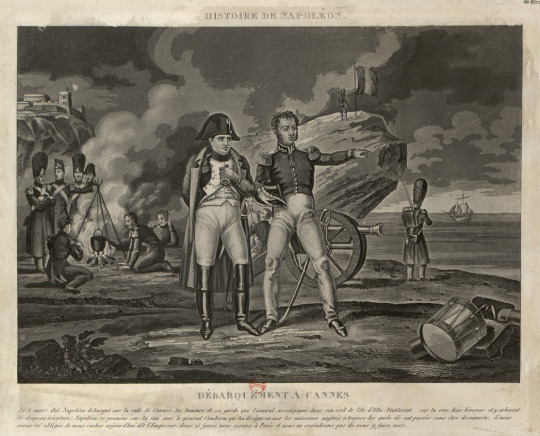
Disembarking at Cannes
le 5 mars 1815 Napoleon débarque sur la rade de Cannes, les hommes de sa garde qui l'avaient accompagné dans son éxil de l'ile Elbe établirent sur la rive leur bivouac et y arborent le drapeau tricolore: Napoleon se promène sur la rive avec le général Cambrone que lui désigne en mer les vaisseaux anglais à travers lesquels ils ont passés sans être decouverts. Si nous avons été obligés de nous cacher aujourd'hui dit l'Empereur, dans 15 jours nous serons a Paris et nous ne craindrons pas de nous y faire voir.
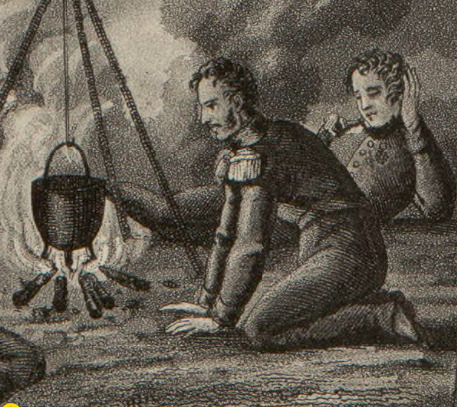
On March 5, 1815 Napoleon landed in the harbor of Cannes. The men of his guard who had accompanied him in his exile from Elba set up their bivouac on the shore and displayed the tricolor flag.
Napoleon walks on the shore with General Cambronne who points out at sea the English vessels through which they passed without being discovered. “If we have been forced to hide today,” said the Emperor, “in fifteen days we will be in Paris and we will not fear being seen there.”
bnf gallica. Vinck's collection. A century of French history through prints, 1770-1870. Flight. 72 (parts 9377-9502), Restoration and Hundred Days
16 notes
·
View notes
Text
Cambronne huile sur toile 81 x 60

#huile sur toile#oil painting#contemporary art#french painter#cityscape#urban landscape#parisfrance#Manuel Leonardi#Leonardi Manuel#Paris#art#pintura#painting#peinture#Cambronne
0 notes
Text


“Les Bleus”, the Republican set of a pair of Grimaud Royalist/Republican Vendee war themed playing card decks with text and art by Jean Bruneau
[Open images for better quality + more under cut]

#General Kleber#General Hoche#General Marceau#General Cambronne#although Cambronne wasn’t a general then#frev#my playing cards#grimaud#napoleonic
16 notes
·
View notes
Text
General Colville in the eleventh hour at Waterloo: “You have fought well, brave Frenchmen! Surrender!”
A relatively unknown French officer named Cambronne: “Shit!”
Beloved author and certified Frenchman, Victor Hugo, forty-ish years later:
#les mis#les miserables#victor hugo#the brick#like okaaayyyyyy Cambronne let’s get it King#only winner at Waterloo!!!#lm 2.1.15#Victor heard that and went “Shakespeare
24 notes
·
View notes
Text
When I die let it be as Cambronne dies, a dumb joke on my lips and the blood of englishmen on my hands
65 notes
·
View notes
Text
The question “if you could put one fuck in Les mis where would you put it” has an objectively correct answer. It’s the chapter where Cambronne responds to the French defeat at the battle of Waterloo by saying “merde”/“shit,” followed by a chapter where Hugo waxes poetic about the power of such a curse word. Replace “merde” with Cambronne saying “fuck!”
186 notes
·
View notes
Text




The Last Square, also known as, Cambronne's 'Merde!'. Volume 2, Book 1, Chapter 14.
#Les miserables#les mis#My Post#Battle of Waterloo#Cambronne#'MERDE!'#The finest reply that a Frenchman ever made#There goes Mr. Hugo's favorite line!#Best part of the Waterloo Chapters#So. The Most Disappointing Part of the Napoleon 2023 was there's NO Cambronne!#The Brick#Napoleon 2023#Les Mis Letters#Historical Pictures
6 notes
·
View notes
Text
Round 0: Sudden Death
These obscure ships only received one submission. Help narrow down which will proceed to Round 1!
Steals will not be counted in Round 0, though propaganda is encouraged.
Already voted? Make sure you also vote in our other polls!
Round 0 Poll #1
Round 0 Poll #2
Round 0 Poll #3
Round 0 Poll #4
Round 0 Poll #5
Round 0 Poll #6
Round 0 Poll #7
Round 0 Poll #8
Round 0 Poll #10
Round 0 Poll #11
Round 0 Poll #12
20 notes
·
View notes
Note
Hola, Sgiandubh.
Mordor no debe estar muy contento con esas fotos que publicaste. Nos acusan de publicar recibos antiguos cuando hay un avistamiento Tait y, ahora, BIF y sus seguidores se dedican a rebloguear antiguas entrevistas donde ella hablaba del prometido "sin nombre". Ya se encargaba el magazine de turno de editar el texto añadiéndolo para que no quedara duda de su identidad. Como ese bloguer de IG que ha cambiado la secuencia de fotos y no ha publicado las que han causado tanto revuelo pero si se ha dedicado a seguir insultando a las #shipperscrazies. Manipulando la información real que hay disponible. Si eso no es reunir a las tropas para tranquilizar los ánimos no sé qué es 😆
Dear Rallying the Troops Anon,
Me alegra mucho que Mordor no esté contento con estas fotos, por supuesto. La idiotez colectiva del Otro Lado es contundente y menospreciar al adversario - la peor estrategia que pueda imaginarse.
But without further ado, let's translate your comment:
'Hi, Sgian-dubh,
Mordor must not be very happy with the pictures you posted. They accuse us of posting old receipts every time there's a Tait sighting, but now BIF and her followers are busy reblogging old interviews where she talked about the 'unnamed fiancé'. The magazine had already dutifully edited the text, adding to it so there would be no doubt about his identity. Just like that Instagram blogger who changed the order of the pics and did not post those that caused so much commotion, but who did continue to insult the #shipperscrazies. Manipulating the real information that is available.
If that is not rallying the troops to calm things down, I don't know what is 😆.'
Well, then - LOL. As I just said: I am very glad that these pics irritated the shit out of Mordor, of course. The collective idiocy of the Other Side is blatant and of course, belittling the adversary - the worst possible strategy.
But remember (hahahahaha), darling: double standard is a paramount policy of the Best Fans and the Only Ones, FWIW. They feel they have a license to do just about everything: repost things when reality bites and people begin to realize maybe things are not just as black and white (but rather more than fifty shades of grey, LOL). Insult people who dared question their honesty and/or intentions, with a ferocity that says a lot about their unsavory mob. And also play the ostrich, when people come to them with info like this very recent one:
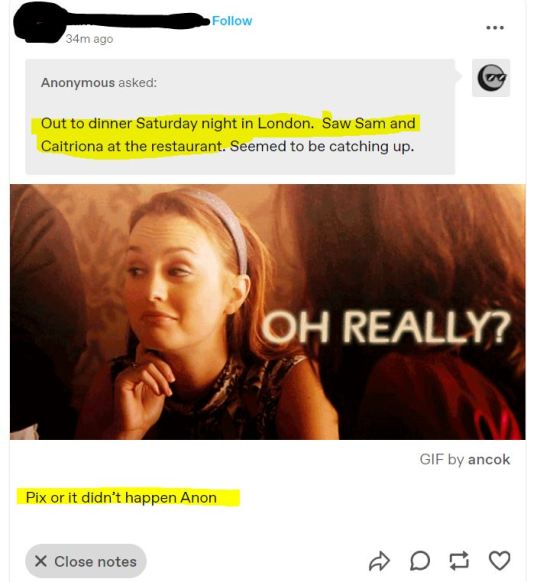
The reactions are just priceless:
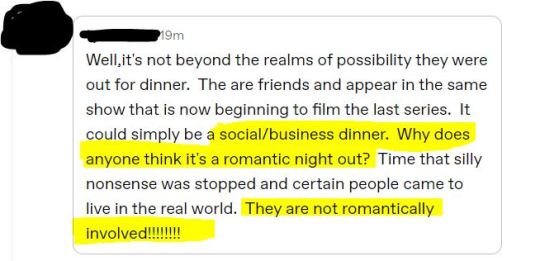
Sure, Jan, wherever you'd live (a 500 people village, somewhere, I suppose). Because social and business dinners happen on Saturday nights, since the dawn of humanity (where is McIdiot, on that Saturday night, since it's all so social/business? rehearsing Smooth Operator with Blonde Bambino?). And yes, of course, 'pictures or it did not happen' (it did happen before, btw, albeit with chaperones, but never with the multi-millionaire, successful music producer!), on that we agree, and it's rare - this round's on me. That being said, it's priceless to read (and almost hear) those banshee shrieks: 'They are not romantically involved!!!!!!!!!!!!' I spat my Coke, again and remembered this wonderful Terry Pratchett quote:
'Multiple exclamation marks,' he went on, shaking his head, 'are a sure sign of a diseased mind.'
So, as you can see, that rally cry was also very, very far away from being efficient. As Cambronne famously said at Waterloo: merde!
One last thing and please try and not hate me for it, since I might have misunderstood what you really meant: there was no editing, as far as I know, of that interview BIF reposted. That name was always there, but once more, never uttered by C and just added for context by the journalist, when she wrote her paper. See for yourself:
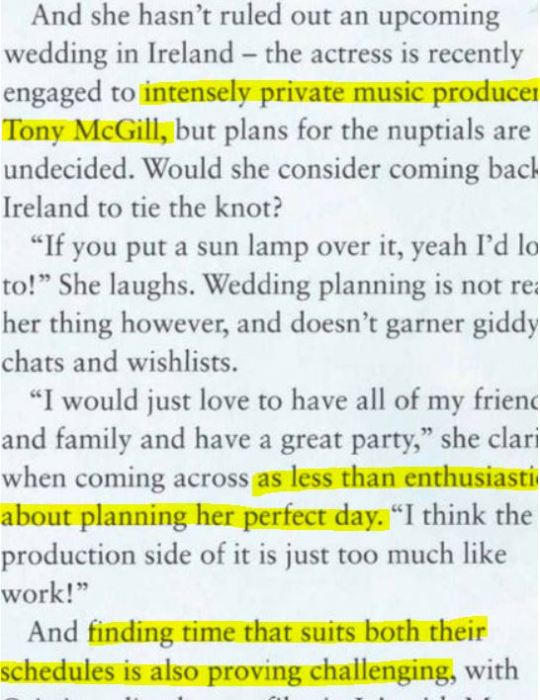
Reading that last phrase tells the whole story: 'finding time that suits both their schedules is also proving challenging'. ROFLMAO. For Christ's sake, the 'intensely private' one ain't no Quincy Jones! And this is how you just know Tatler sugarcoated a very bland, unenthusiastic interview. A very common practice.
Salud! Don't be a stranger, Anon. You inspire me. 😘
PS: that banshee shriek was completely unnecessary. Anon just said they were 'catching up', nothing more (which immediately makes me think there was something more about it). Nobody suggested anything romantic. Pavlov's dog will always react to the stimulus, though. And thank you, querida, for the heads-up. 😘🙌
98 notes
·
View notes
Text
trying to imagine hugo & cambronne meeting like
hugo: omg cambronne, i'm SUCH a big fan, you were so badass for telling off the english & fate that one time, that disgusting and obliterating word—shit—
cambronne's family, who hugo mistook for cambronne himself: did you just say a potty word
13 notes
·
View notes
Text
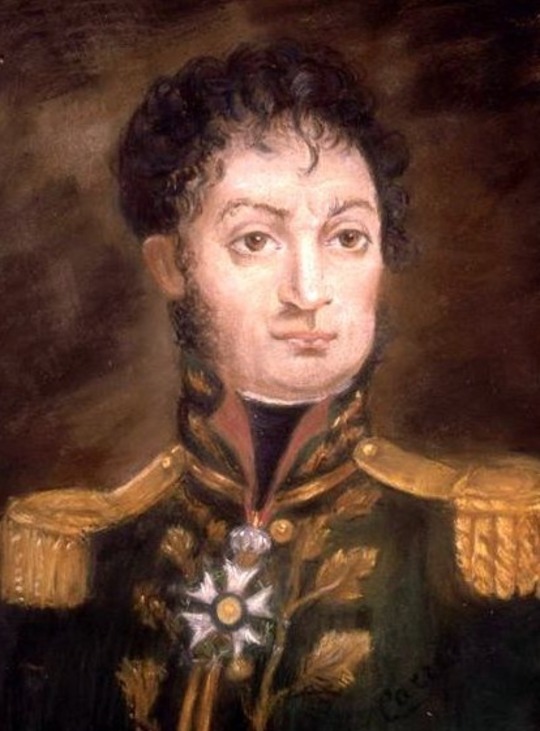

Pierre Jacques Étienne Cambrinne:
a. “Victor Hugo made him say ‘merde’ (shit) in his hit novel les misérables for which Hugo was severely criticized. People claimed Hugo was destroying Cambronne’s legacy (which is very funny) He participated in both the revolutionary wars and in the napoleonic wars (the duality of man) and was wounded at waterloo He even married the nurse who cared for him after he was wounded in the aforementioned battle (she was scottish) He was made a baron in 1810 and later he was made a viscount His name even became a euphemism for shit!”
Stephen (Esteban) Maturin:
a. “This man is The Most. Naturalist, spy, surgeon, Irish and Catalan patriot. If you’ve only seen the movie, you’ve missed how incredibly snarky and weird he is. His politics are radical, but he is unfortunately in love with a golden retriever ship captain, who he met because he elbowed him at a concert for being offbeat. Joined the British navy because he was broke and the captain was attractive. Everything about his relationship with Jack is 'me and the bad bitch I pulled for being autistic'"
47 notes
·
View notes
Text
A thought, while I'm feeling sappy about Waterloo and the barricades in Les Mis:
Cambronne is established as the Real Victor of Waterloo.
The winner of the battle of Waterloo was not Napoleon, who was put to flight; nor Wellington, giving way at four o'clock, in despair at five; nor Blucher, who took no part in the engagement. The winner of Waterloo was Cambronne. To thunder forth such a reply at the lightning-flash that kills you is to conquer!
So who's the winner of the barricade sequence?
I think it's Prouvaire, calling out to the future in words we do indeed hear. I think it's Feuilly, honoring unity in an answer to nations insulting each other at Waterloo. It's Gavroche, singing under fire. It's Combeferre, who seizes the victory of honoring his conscience and the innocent good he longs for in a moment that should make his truth impossible. It is, especially, Enjolras and Grantaire, who get the last words , and face "the lighting flash that kills you" not with despairing defiance but a smile and love.
The Waterloo section is "Waterloo won by France"; the barricade sequence is "1832 won by the Republic". And the barricade is a much more effective victory, for a lot of reasons, but I've been up way too long and can't explain it to my own satisfaction right now. It's all very poetic and I'll start crying if I think about it too much.
...But also I think it's a heck of a turn of fate that the person who ultimately won 32 for the republic was the guy whose only involvement with the fighting was to hide in an alley for a bit until shit calmed down. Les Mis is Hugo's powder keg, I guess! Good job, Marius, you got there in the end XD
35 notes
·
View notes